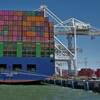Concern Over Trade Wars Impacts Shipping Confidence
Confidence in the shipping industry has fallen marginally over the past three months, largely as a result of ongoing concern over trade wars and increased regulation, according to the latest Shipping Confidence Survey from leading shipping adviser and accountant BDO.
The average confidence level in the three months to May 2019 was 6.1 out of a possible maximum of 10.0. This is slightly down on the figure of 6.2 recorded in February 2019.
Confidence was up in Asia, from 5.8 to 6.0, and in North America, from 5.6 to 6.4. In Europe, meanwhile, there was a drop in overall confidence levels from 6.3 to 6.1.
The chartering sector continues to be the most volatile in terms of respondent confidence, with ratings varying between 4.7 and 7.7 during the past two years. This time, the confidence level was up to 6.2 from 6.0 three months ago. The ratings for owners and managers, meanwhile, were unchanged at 6.3 and 5.8 respectively, while the rating for brokers was down from 5.9 to 5.7.
The survey was launched in May 2008 with an overall rating for all respondents of 6.8 out of 10.0.
According to the BDO quarterly survey, the likelihood of respondents making a major investment or significant development over the coming year was up from 5.3 to 5.4 out of 10.0. Owners’ confidence in this regard was up from 5.4 to 6.3, while the rating for charterers was 5.6 compared to the survey high of 7.3 recorded last time. The confidence of managers and brokers in this category was also down, from 5.6 to 4.8 and from 4.9 to 3.9 respectively. Expectations were up in Asia, from 5.2 to 5.5, and in Europe, from 5.3 to 5.4.
The number of respondents who expected finance costs to increase over the coming year was unchanged at 48%. The figures for owners and brokers were down, but up in the case of charterers and managers.
Demand trends were cited by 26% of respondents as the factor most likely to influence performance over the next 12 months. Competition (19%) and finance costs (13%) featured in second and third place respectively in this context.
The number of respondents expecting higher freight rates over the next 12 months in the tanker market was up by 4 percentage points on the previous survey to 55%, with charterers (75%) leading the way. In the dry bulk sector, expectations of rate increases were down overall from 52% to 48%, with charterers the only category recording an increase in expectation levels. The numbers expecting higher container ship rates, meanwhile, rose by 9 percentage points to 35%. Net rate sentiment was positive in all three tonnage categories and noticeably improved on the last quarter for container ships.
When asked to estimate the level they expected the Baltic Dry Index (BDI) to reach in 12 months’ time, 50% of respondents (compared to 36 % 12 months ago) anticipated a figure of between 1000 and 1499, while 22% (42% last time) put the likely level at between 1500 and 1999. “One could be more bullish about the BDI if there was less global tension around,” said one respondent.
Richard Greiner, Partner, Shipping & Transport at BDO, says, “A small dip in confidence is not surprising given the recent volatility generated by the US-China trade wars, the heightened tension in the Arabian Gulf, the failure to conclude Brexit negotiations, and general political instability in many parts of the world. Markets love volatility, but it can have an adverse effect on confidence.
“Trade wars certainly formed the over-arching theme for this quarter, but they are not the only recurring topic. The cost and technical implications of complying with existing and incipient regulation was referenced on a number of occasions, typified by the respondent who noted that the high level of regulation “makes it extremely difficult to make a profit”.
“Despite the challenges the industry is facing, there are a number of positive indicators. New technology is making shipping more attractive to investors, and will moreover act as a trigger to accelerate the pace and extent of recycling. Higher freight rates should logically follow, and those who hold their nerve will ultimately benefit.”













